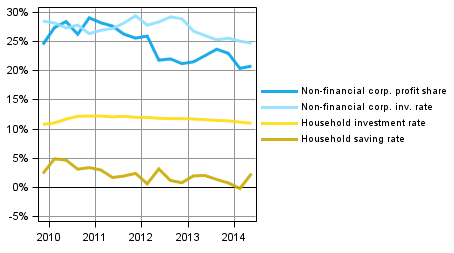Published: 25 September 2014
Households’ saving rate grew in the second quarter of 2014
Households' saving rate turned positive again after having been negative in the first quarter of the year. The saving rate improved as earned income and property income increased and consumption went down slightly. The profit share of non-financial corporations grew by 0.4 percentage points compared with the previous quarter. The investment rate of both households and non-financial corporations decreased somewhat from the previous quarter. Adjusted disposable income describing households' economic well-being remained in real terms more less on level with the corresponding quarter last year. These data derive from Statistics Finland’s quarterly sector accounts.
Key indicators for households and non-financial corporations, seasonally adjusted

In the second quarter of 2014, the profit share of non-financial corporations, or the share of profits in value added, grew by 0.4 percentage points to 20.7 per cent from the previous quarter. The investment rate of non-financial corporations, or the proportion of investments in value added, fell by 0.4 percentage points to 24.6 per cent. The key figures were calculated from seasonally adjusted time series.
Households' saving rate was 2.3 per cent in the second quarter of 2014. In the previous quarter, the figure was -0.3 per cent. The saving rate improved as earned income and property income increased and consumption went down slightly. The saving rate refers to the proportion of savings in disposable income. In the second quarter, the investment rate of households accounted for 10.9 per cent of disposable income, which was slightly lower than in the previous quarter. Most of households' investments were investments in dwellings.
Households' adjusted disposable income increased from the corresponding quarter in 2013 by 0.1 per cent adjusted for price changes. Adjusted income is the indicator recommended by the OECD for evaluating the economic well-being of households. Adjusted disposable income is derived by adding individual services produced by the public sector, such as education, health and social services, to the disposable income of households.
Sector accounts are calculated only at current prices. However, a volume indicator describing the development adjusted for price changes is calculated for households' adjusted disposable income in a separate Appendix table. The profit share, saving rate and investment rate are calculated from net figures, which means that consumption of fixed capital is taken into account. Households do not include non-profit institutions serving households.
Source: Sector accounts, Statistics Finland
Inquiries: Pekka Tamminen 029 551 2460, Katri Soinne 029 551 2778, kansantalous.suhdanteet@stat.fi
Director in charge: Leena Storgårds
Publication in pdf-format (328.2 kB)
- Tables
-
Tables in databases
Pick the data you need into tables, view the data as graphs, or download the data for your use.
Appendix tables
- Figures
-
- Appendix figure 1. Volume development of households adjusted disposable income (25.9.2014)
- Appendix figure 2. Households saving rate (25.9.2014)
- Appendix figure 3. Households investment rate (25.9.2014)
- Appendix figure 4. Non financial corporations profit share (25.9.2014)
- Appendix figure 5. Non financial corporations investment rate (25.9.2014)
- Revisions in these statistics
-
- Revisions in these statistics (25.9.2014)
Updated 25.9.2014
Official Statistics of Finland (OSF):
Quarterly sector accounts [e-publication].
ISSN=2243-4992. 2nd quarter 2014. Helsinki: Statistics Finland [referred: 9.3.2025].
Access method: http://stat.fi/til/sekn/2014/02/sekn_2014_02_2014-09-25_tie_001_en.html

